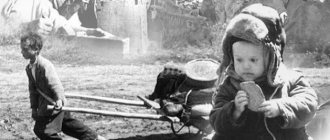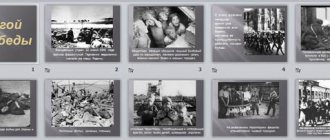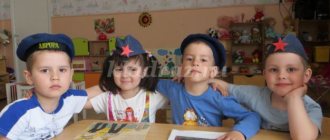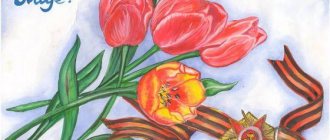The topic of our research work, “Life as a feat,” is about the heroism of the Soviet people during the Great Patriotic War.
We believe that the topic of war remains relevant in our time, since there is a page in the history of the Russian state, reading which again and again it is impossible not to feel horror from its contents. Yes, this page is made of fire and smoke, of grief and hope, of the great power of struggle and the joy of victory.
More than 70 years have passed since the day when bright fireworks lit up over Soviet land, signifying the great long-awaited victory of our people over Nazi Germany. But that time is not erased in the memory of people, especially those who forged victory at the cost of their own lives.
When writing this work, we used material from Internet sites, literary publications, memories of Maya Kuzminichna Kozhemyakina, war and labor veteran Ekaterina Egorovna Ilina, and their family archives. We have been collecting material about the participation of our fellow countrymen in the war for quite some time. But every meeting with veterans is a new page in their lives.
Relevance : this topic is relevant because... the history of people, the history of families is able to tell about those features of the historical development of the country that usually remain unknown, it allows you to take a multifaceted look at a particular historical event, and therefore better understand its causes and consequences. Comparing the facts of history with the destinies of people will allow us to look at events “from the inside”, to consider the influence of historical events on the lives and destinies of many people in our Motherland. The purpose of the study is to intensify search and research activities, study the history of the 20th century using the example of the lives of fellow villagers, and cultivate a respectful attitude towards the history of the small homeland and its inhabitants.
Research objectives:
1. Identify the influence of historical events in Russia in the 20th century on the fate of our ancestors. 2. Explore the fate of ordinary people on the home front, determining the price they had to pay for victory. 3. Get acquainted with surviving photographs, documents, and work with the family archive. 4. Tell school students about your work during excursions to the school museum.
The object of the study is the life and work of Maya Kuzminichna Kozhemyakina and Ekaterina Egorovna Ilyina during the Great Patriotic War.
The subject of the research is archival documents, letters, biography of fellow countrymen, their work activities, memories.
Research methods : - study of archival material; — meeting with fellow villagers; — correspondence with school graduates; — collection of local history material; - personal conversation.
Hypothesis : among our fellow villagers there are people who committed civil feats during the Great Patriotic War, survived the atrocities of the Nazis, forged victory over the enemy in the rear; We assume that knowledge of the modern history of our small homeland and the people who glorified it can qualitatively increase the level of patriotism among schoolchildren.
Research plan : 1 Introduction. 2. Main part. The war broke out unexpectedly. A) Life under occupation. B) Father's parting words. 3. Conclusion. 4.Literature. 5.List of illustrative material for the research work.
↑ Introduction
History is a large canvas, and human destinies are the knots from which it is woven. Each is unique, and at the same time it is only part of the common destiny of the entire people. Nadezhda Mzhachikh. The Great Patriotic War is the most terrible war in Russian history. This war hardened many, but at the same time it crippled the destinies of people, changed their lives, brought them the pangs of suffering, deprivation, bitterness and sadness. There are fewer and fewer people's heroes, our dear war veterans and home front workers. The youngest are almost 90. And to each of those living today and those who have passed on to another world, you can devote a whole book about the great feat during the years of difficult trials that befell them. The workers of the home front, along with the soldiers at the front, forged victory. During the years of the great battle, many of them were just children. They didn’t understand everything then; they were simply small and had no relation to the events in the life of the village, or everything was simply not recorded in the smallest detail. But the war became the common biography of an entire generation of military children. Children encountered the war at different ages. Some are very young, some are teenagers. Someone was on the threshold of adolescence. The war found them in capital cities and small villages, at home and visiting their grandmothers, in a country camp, on the front line and in the rear.
↑ The war broke out unexpectedly
A) Life under occupation. War and youth... War and mothers... and widows... But the worst, the most inhumane is War and children. Children of war…
The family of Maya Kuzminichna Kozhemyakina lived in the Smolensk region in the village of Bartenovo, Glinkovsky district. The Klokovo railway station was located 2 km northwest of the village. When the invasion of Nazi Germany on Soviet soil was announced, mobilization began in Smolensk and the region. And already at the end of June 1941 there was a massive air bombing of German planes. Under the onslaught of the enemy, the Red Army retreated. So Maya’s family found themselves in an occupation that lasted for 3 years. Maya Kuzminichna's father joined the partisan detachment. He never returned home. At the end of the war, the family received notification of the death. The time of occupation is a time of constant fear for your life and the lives of people close to you. Maya remembers well how often her mother cried, how she tightly closed the windows and doors when the Germans appeared in the village.
Often in the first days of the war, planes flew over the village, their roar forcing residents to leave their houses and, bowing their heads, look into the sky. It became clear later that they were bombing the railway station. Sometimes bombs fell not far from the village, then everyone, fleeing the bombing, hid in the trenches that they dug themselves. For three years everyone lived in fear, cold and hunger. In order not to die, the children ran to pick berries and mushrooms, when there were no Germans in the village, the women baked bread, cooked porridge, whatever they needed. Maya miraculously survived, as she was near death from exhaustion. The relatives whose cow survived gave it milk to drink.
Every day of being under occupation required great courage from adults and children. One day, a friend of my father came to the house and told everyone to take refuge somewhere. The fascists have prepared lists of communists and now their families will be shot. Maya’s father was a communist, which means this family should be shot along with everyone else. But the mother did not want to hide, because she understood that she would die in the forest with small children, and there was nowhere else to go. At night her whisper could be heard, my mother prayed to God so that she would not be left without children, and the children without her. It would be better if the Nazis shot everyone together. And Maya's family stayed at home. And at night the commandant’s office was raided by Soviet planes, and it was bombed, all the lists were destroyed.
After this, the Nazis did not leave the village alone. They visited often, sometimes several times a day. They beat innocent people, drove them out of their homes, forcing them to stand for a long time in the sun or in the cold, sometimes residents disappeared to God knows where, everyone understood that they would not return alive. By their actions, the Nazis tried to break the will of the surviving old people, women, and children.
When Soviet troops began to advance, the Nazis became even more brutal. And in April 1943, the monsters burned the neighboring village of Lyakhovo along with its inhabitants. Later, Maya Kuzminichna learned that about 400 people had died. And one teacher jumped out the window from a burning house, but her two children remained in the fire, and she jumped back to them. This soul-chilling story still resonates painfully in Maya Kuzminichna’s heart; she cannot remember it without tears.
After the liberation of the Smolensk region, Maya moved to the village of Lugovskoye, but she always dreamed that she would return to her homeland, where the forests are full of berries and mushrooms, where the grass is taller than her height, where the magical sun comes out from behind the treetops. But the war confused all plans. My mother died, my father died, and there was no one to return to. I had to build my own life. After the war, it was not easy for everyone; what helped us survive was that people supported each other and shared their last. Residents of a small village in the Smolensk region, being in the clutches of the enemy, having survived fear and pain, remained alive - this is a real feat.
During the story, Maya Kuzminichna’s voice trembles, tears well up in her eyes. She often mentions the name of God and asks him for peace and quiet. And just like her mother values her children and grandchildren, they come first for her. Every time she meets us, she says: “What a blessing that you didn’t see the war, that we live in peacetime. Treasure them, live in peace, love and harmony, help each other. Without support, our people would not have survived the war.” B) Father's parting words War! What a cruel word! This nightmare lasted for almost four years. For almost four years, hundreds and thousands of people greeted each new day with horror. Hundreds and thousands of families saw off not only their grandfathers, fathers, brothers, sons, but also daughters, sisters, and mothers to the front. Hundreds and thousands of families lost relatives and friends at the fronts, in concentration camps, in the rear, in lands occupied by the Nazis. The Soviet people deliberately endured any hardships in order to bring victory closer. The Great Victory was forged not only at the front, but also in the rear. The coordinated work of rural workers, workers at machines, medical workers in hospitals and clinics, and the subversive activities of partisans contributed to the defeat of the enemy. Any feat that the home front workers accomplished was summed up in simple words: “What is needed for the front, for victory, we will do!”
Boys and girls of the 40s... They all have one past, one fate - their bitter war childhood: suffering, loss of family and friends. And for many, death was nearby. This is not forgotten. No matter how many years have passed.
Ilyina Ekaterina Egorovna was not yet 15 years old when the war began. She is originally from Kharkov. Father Yegor Kirillovich, a career military man, guarded an important strategic facility in the city - a military plant. Elder sister Klava also worked here. They lived amicably, although the girls lost their mother early. She died when Katya was only 3 years old. Klava was getting married, so her fiancé Andrei often came to the house. But the war made adjustments to the life of this small friendly family.
When the start of war was announced, the city began to be evacuated. The enemy was quickly approaching, explosions were heard, and fascist planes appeared. The factories were practically not exposed to attacks - the Germans clearly sought to preserve the production base of the Kharkov industrial region for the purpose of its further use. Therefore, the factories began to be evacuated first. Often, under enemy artillery fire, workers loaded the remaining equipment and, with the last echelons, already left their homes under fire. Katya did not see her loved ones for days, who were evacuating the plant’s equipment. Klava left the city along with the last echelon. Ekaterina Egorovna heard nothing more about her sister. She went missing, apparently perished along with the train.
One day during a lesson, the director entered the classroom and ordered the students to pack their briefcases, as they would be evacuated from the city. No one knew where they would go, with whom. When everyone was seated in the cars, Katya, with tears in her eyes, began to ask to go home, so that she could at least take photographs of her father and sister. Since the road went past the house, the request was fulfilled. To this day, Ekaterina Yegorovna does not understand how they could agree to her request, because the enemy was already at the city walls.
At the railway station they were transferred to wagons in which cattle were transported. So they rode, curled up on the straw, into the unknown. On the way, they gave us a glass of milk and a crust of bread so that we wouldn’t die of hunger, which made us want to eat even more.
Katya ended up in the village of Voskresenka, Bezymyansky district, Saratov region. Alone among strangers. Until her last days, she will remember Aunt Matryona, who helped her survive by taking Katya into her apartment. Rather, they helped each other. Aunt Matryona’s son recently died at the front, a handsome man who was famous throughout the area for his cheerful character.
It’s good that on Katya’s path we came across kind, sympathetic people who helped with advice, who would bring a piece of bread, who would give a mug of milk. I got a job on a collective farm. At first she collected spikelets in the field after harvesting, then they put her on a haymower, and the next spring she became a tractor driver. At the age of 16 she was driving such a huge machine. But even here it was not easy, the tractors were very rigid, with iron wheels and iron seats. During work, it seemed that all the internal organs would be torn off from the terrible shaking. During cold days, clothes froze to the iron seats. From hopelessness, from self-pity, tears blurred my eyes. Despite this, everyone worked tirelessly, because they understood that the front needed bread. I always wanted to eat and sleep. Work began early in the morning and ended when it became completely dark. And at night the worst thing began - longing for my father, sister, native land.
One day the postman brought a letter. It was a military triangle - news from my father. And soon Yegor Kirillovich himself came for a short while. He talked with the foreman, Matryona Stepanovna, hugged Katya, telling her to listen to her elders, and left for the front. She received another triangle letter at the end of 1942. My father wrote sparingly about himself, that the new year would soon come and the enemy would be defeated, and then the funeral came. Dad died in the Kharkov direction. Now Katya is left completely alone. She believed in victory and hoped to meet her sister. And she always cursed the war. The girl dreamed of becoming a doctor, but this dream was not destined to come true.
All her life, Ekaterina Yegorovna’s surviving letters from the front warmed her. For 74 years now, on May 9, she again and again unfolds the soldier’s triangle and talks with her father, telling how she lives, about her children and grandchildren. After all, these are not just letters - these are testamentary letters, letters of instruction to a daughter who, as a teenager, was left alone among strangers. Here are the lines from Nemykin’s letter to E.K. daughters: “Katya! Our Red Army is rapidly advancing to the west, Hitler's army will be completely defeated. Kate! Listen to Aunt Matryona and don’t raise your nose too high. Your father Nemykin. May 23, 1942"
Now Ekaterina Egorovna is almost 90 years old. She is confident that she has fulfilled her father's orders. She grew bread for the front, knitted socks, taught Aunt Matryona, helped those who needed help, and raised wonderful children. And every day, every hour, I waited for news from my father and sister. And when the “Wait for Me” program appeared, she wrote letters asking her to find her relatives. But they were never found. They paid for the Victory with their death. Ilyina E.E. awarded the medal “For Valiant Labor during the Great Patriotic War of 1941-1945”, she worked honestly even after the war, she has many awards and letters of gratitude. He does not stay away from social work - he meets with schoolchildren and participates in events. Looking at yellowed photographs and re-reading letters from the front, Ekaterina Egorovna thinks about how her life would have turned out if it weren’t for that damned war. She watches war footage with tears in her eyes and is always surprised: “Why can’t they come to an agreement and live in peace.” She really knows what war is!
Research project “My great-great-grandfather, a participant in the Great Patriotic War”
War is a great shock for our country, it is great losses, it is extraordinary heroism of the Russian people. Unfortunately, it is difficult for us, the younger generation, to feel the whole tragedy of those days when every step along the front road was paid for in blood.The war is over, but the memory of it still lives on. And it will always live as long as we talk about it, and honor the memory of those who died in this war. Relevance
: Unfortunately, there are fewer and fewer living witnesses of those events, people who defended our Motherland. I conducted a survey of my class and found out that many children know little about the fate of the participants in the Great Patriotic War and the events of those years. I am proud that I have such a relative, a man with a capital M - this is my great-great-grandfather Ivan Petrovich Bayborodov.
It is very important for me that the memory of my great-grandfather remains, like a whole story, so that my peers learn more information about our fellow countryman, defender of the Fatherland.
Purpose of the research work
: using the example of the biography of my great-grandfather Ivan Petrovich Bayborodov, to show courage, heroism, love for the Motherland, and the fortitude of a Soviet soldier.
Tasks:
1. Collect documentary material.
- Study documentary sources about the history of my family.
- Determine the role of my family in the history of the Great Patriotic War. 4) Trace the military biography of my great-grandfather 5) Draw the attention of my peers to study the history of the Motherland.
Object of study:
Biography of my great-grandfather Ivan Petrovich Bayborodov, a participant in the Great Patriotic War.
Research sources:
When writing the work, materials from the museum archive and Internet resources were used. Award lists and awards were studied.
Our grandfathers and great-grandfathers defended the world, and we, the younger generation, must preserve it! If we preserve the memory of our participants in the Great Patriotic War, then we will love our native land more and be proud of the people who defended peace on our land. If a person’s life path is worthy, then he can and should serve as a role model for the younger generation.
Practical significance of the work:
The opportunity to use materials in class work, this work can encourage other children to search for unknown information about their relatives.
Main part
The war in the life of great-grandfather Ivan Petrovich Bayborodov
The history of the war, the bloodiest and most difficult, the most significant in its results and consequences, is the history of the Great Patriotic War.
Among those who fulfilled their duty as citizens, protecting from the enemy not only their home, their loved ones, but also the entire planet, there are the names of my relatives, our fellow countryman. Meet:
my great-great-grandfather on my mother’s side is Ivan Petrovich Bayborodov, born on October 29, 1903 in the village of Sardan, Mozhginsky district. In 1918. when he was 16 years old, my great-great-grandfather voluntarily joined the Red Army, was a machine gunner, and was wounded. In 1919 he was demobilized and returned home.
My great-great-grandfather began his career as a simple railway worker on the Gorky Railway. He was a passenger train driver.
In 1929 he graduated from the railway technical school in Syzran. He worked on the railway in the village of Bondyuzhsky (now the city of Mendeleevsk, Tatarstan). Start of the war
In August 1941, the Bondyuzh district military registration and enlistment office was drafted into the army.
Leaving for the front, I wrote a short letter: “I’m going to the front to beat the Nazis. Take care of your family... I’m going to fight for her.” A family remained in Mozhga - five children and a wife. Battle path
Most of all, his “Military ID” can tell about a soldier. This is not just a document and the soldier’s active military service recorded on paper. This is a whole story of a man’s life, feat and patriotic valor. Unfortunately, this document has not survived to this day, but after studying Internet resources, museum archives, and archival materials of my city, this is what I learned: I walked along the roads of war from Stalingrad to Berlin. Guard foreman, reconnaissance officer, squad commander of the 23rd separate Guards reconnaissance company. Awarded four medals, Orders of Glory of the 1st, 2nd and 3rd degrees.
On December 13, 1941, the first battle near Moscow, during the liberation of the city of Kalinin (now Tver).
On May 9, 1942, in the battles near Kursk, he received his first slight wound.
On September 25, 1942 he was wounded for the second time. He returned to his unit on October 14, 1942.
On November 19, 1942, he took part in the destruction of an encircled group of Germans in the Stalingrad area. Military merits were noted by the command of the Soviet army. Was awarded:
Medal for Military Merit. For the defense of Stalingrad.
Brief summary of personal military feats or merits: On January 13 and 14, 1943, in the battles of the Goloi gully, then in the battles on the territory of the village of Barrikady on January 30 and 31, 1943, assistant sergeant major, party organizer of the guard battery, senior sergeant I.P. Bayborodov. under heavy enemy fire, he delivered shells and food to battery firing positions. The artillerymen of the regiment in which my great-grandfather served destroyed 29 German tanks, and in the final stages, another 16.
The first "language". Order 3rd class
Date of feat: 13.03. 1944, 03/16/1944. My great-great-grandfather, at the head of a reconnaissance group of 8 people, secretly penetrated behind enemy lines. As a result of the battle, the scouts defeated a local garrison of 30 German soldiers and officers, captured a prisoner, also on 03/16/1944 in the same area of Bayborodov I. P. , acting in a group of reconnaissance officers, repelling an enemy counterattack, he destroyed over 10 soldiers, two non-commissioned officers and captured one officer.
On March 13, 1944 he was awarded the Order of Glory, 3rd degree.
Scout from God. Order 2nd class
On 02/13/1945, during the assault on the city of Poznan (Poland), carrying out a combat mission of the command, at the head of a group of scouts, he penetrated behind enemy lines in the area of block No. 24 of the city, scouted out the location of enemy forces and captured the “tongue”.
On February 19, 1945, with a group of 15 scouts, he entered into battle with a German battalion of over 300 people. My great-great-grandfather, not sparing his life, fought off the attack where he personally destroyed 9 people and captured 13 people. The enemy attack was repulsed.
On March 17, 1945, he was awarded the Order of Glory, 2nd degree.
to Berlin.
On April 14, 1945, with a group of scouts, he found a workaround and led 2 battalions to the German flank, ensuring a successful infantry offensive.
When the assault on Friedrichshagen began, my great-grandfather with a group of scouts was one of the first in the division to break into the city, in battle, together with the scouts, he destroyed up to 15 enemy soldiers and captured an assault gun. Peaceful life
In August 1945, my great-grandfather was demobilized and immediately came home.
Didn't rest on his laurels. Lived in the city of Mozhga, Udmurt Republic. He worked as deputy director of the Mozhginsky timber industry enterprise for watering. The last reward
. By decree of the Presidium of the Supreme Soviet of the USSR dated May 15, 1946, for courage, courage and fearlessness shown in battles, Guard Sergeant Major I.P. awarded the Order of Glory, 1st degree, becoming a full Knight of Glory. On May 29, 1951, the heart of the brave warrior stopped beating. In our city, Lesozavodskaya was renamed into street named after I.P. Bayborodov, in memory of our fellow countryman, holder of 3 Glories. From the archival department of the Administration of the Moscow City Mozhga, fund No. 11, inventory No. 1, files No. 368, sheet No. 202,209 dated October 25, 1967. Lesozavodskaya Street - to I.P. Bayborodov Street.
Conclusion.
No one is forgotten, nothing is forgotten. As long as we remember the heroic deeds of our grandfathers and great-grandfathers, are proud of them, and will also love and defend our Motherland, no enemy will dare to disturb us. My great-great-grandfather passed with honor all the tests that befell him. I believe there is a lot to learn from the generation of our “grandfathers and great-grandfathers.” I want to live my life with dignity and be like my great-grandfather. On May 9, I annually participate in the procession of the “Immortal Regiment” in the city of Mozhga with a photograph of my great-great-grandfather Ivan Petrovich Bayborodov. I remember! I'm proud
For every person, family is the most valuable thing in life. A person should know not only close relatives, but also know the history of his family. The history of the family does not end; it continues in the children. Which means, in family memory. History is made not only by heroes, but also by ordinary people. My family is one of the millions of pages of a very interesting and fascinating book called “History of Russia”.
Let me not name all the names, There are no blood relatives. Is it not because I live because they died? What I owe to them, I know. And let not only verse, My life be worthy of their soldier’s death. (S. Shchipachev)






